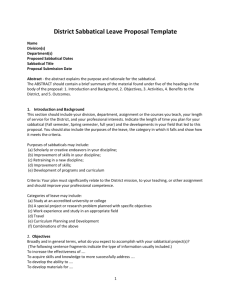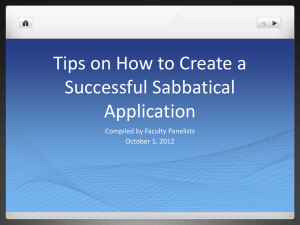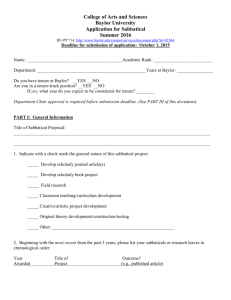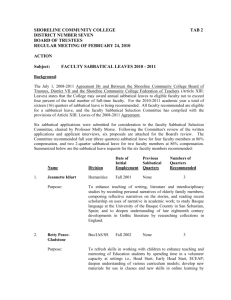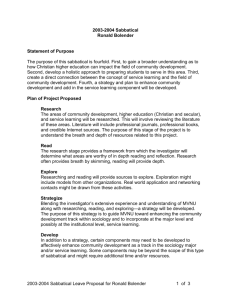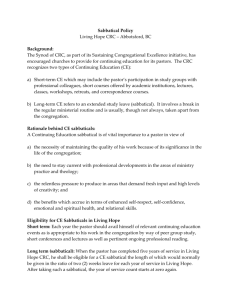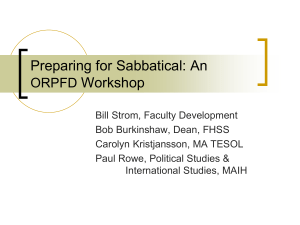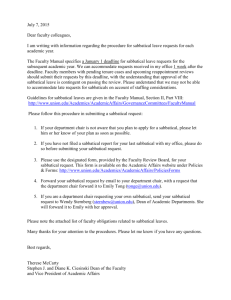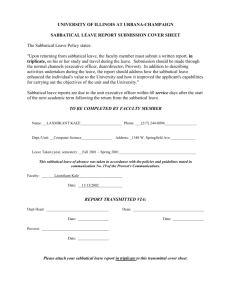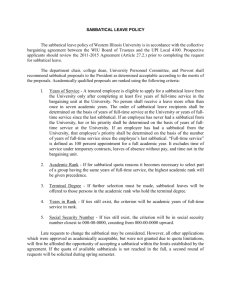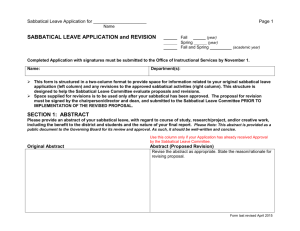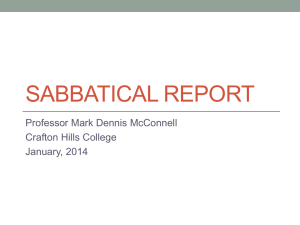Sabbatical_Time_for_2013
advertisement
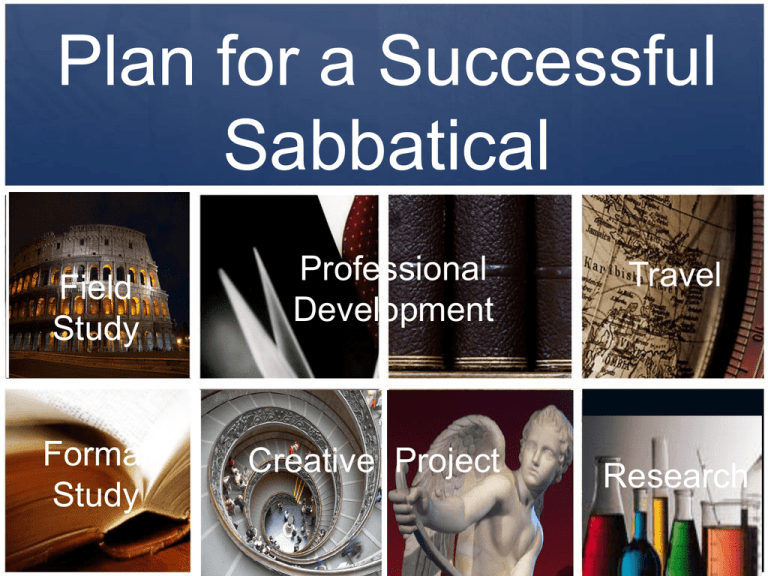
Plan for a Successful Sabbatical Field Study Formal Study Professional Development Creative Project Travel Research Eligibility • Faculty become eligible to apply for a sabbatical only after six consecutive years of full-time employment at SMC. • A fully developed sabbatical proposal must be submitted by November 4, 2013 for consideration. – Proposal forms will be available September 23, 2013. Sabbatical Leaves Typology • Professional Development: – Study or experience designed to improve teaching effectiveness--not possible through normal workload assignment. • Formal Study: – A course of study leading to increased mastery in subject field; development of an additional area of specialization. • Independent Research, Creative Project, or Field Study: – To carry project of a scope or nature not permitted by a normal workload assignment. • Professionally Beneficial Travel: – To enable acquisition of knowledge, skills, expertise, or an area of specialization within a discipline. What the Sabbatical is not! Examples 1) A vacation 2) Travel unrelated to student learning and/or your professional development 3) Updating your syllabus or course packet. 4) Time to do work that is part of your regular assignment 5) Time to engage in curriculum development that is part of your regular assignment Key Points to Consider • Developing a successful sabbatical proposal necessitates: – Careful planning – Writing • Is your plan sufficiently aggressive yet achievable? • Does your plan include contingencies for unanticipated events? What will you do if things don’t go as planned? Application Process: PLANNING 1. Reflect upon your personal motivation for proposing a project. 2. Define what you intend to accomplish. • How does your “project” relate to sabbatical leaves and to college goals, strategic initiatives, learning outcomes? 3. Note how your sabbatical will benefit: you, colleagues, department, college, students. 4. Outline a realistic plan for achieving your goals. • Identify specific objectives and activities you will undertake, and the timeline you will follow. 5. Identify your anticipated results. 6. Ask yourself and others if your plan is realistic. Application Process: WRITING 1. Above all, adhere to sabbatical instructions and address all question thoughtfully, yet concisely. 2. Write your proposal after you have thought out all details of your sabbatical. – Consider reviewing the Sabbatical Proposal Evaluation Matrix to get an idea of how your proposal will be evaluated. 3. Introduce yourself and your discipline. 4. Describe the main focus of your sabbatical with sufficient detail. Application Process: WRITING (cont.) 6. Describe how you will document your activities (examples): – – – – – – Curriculum Outline/Syllabus Diaries Slides, films, and other multimedia tools Travel receipts Manuscript Production of creative work 7. What methods will you use to disseminate your results? – A Sabbatical Report is required, but you may also develop/produce: • Web Pages • Presentations and workshops • Papers The methods for documenting and disseminating results will be different for every proposal depending on the type of sabbatical activity—there is no right answer. General Tips • Figure out what “worked” in the past – Review past proposals, both successful and unsuccessful • Abstracts of some successful sabbaticals are available on our website. – Meet with past sabbatical recipients – Ask your colleagues to critique your application – Your project should NOT rely heavily on others to do conduct key aspects of your sabbatical work. – The sabbatical project should constitute one semester’s work. General Tips • Be “reader friendly” – Write for the tired, impatient reader who is reading your application last: • Ensure that your proposal stands out from the rest of the applications • Be professional, but personal • Don’t make the reader hunt for or guess the answer to a question • Use headers, bullets, bold/italics, and “white space” to help guide the reader through the various sections • Use 12-point, easy to read font • Don’t use jargon specific to your discipline that readers may not understand • Don’t forget to spell check and proof Timeline—2014-2015 Sabbatical September 23 Application available October 3 Sabbatical workshop at 11:15 am November 4 Application deadline November 20 Recipients are selected November 26 Senate Exec reviews recommendations December 3 Senate consideration for approval December 10 Board of Trustees consideration for approval
